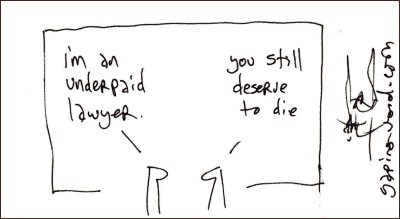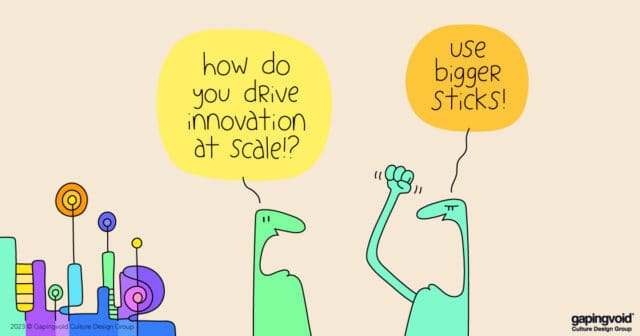
Thanks to Matthew Homann for this one, which was originally published here:
The Lawyer’s Client Manifesto
1. You have wants. You have needs. Focus on the needs first. Wants are bonus.
2. If you are seeing a lawyer because your dispute is “not about the money, but about the principle of the thing” don’t be surprised if your lawyer runs away. You can never be satisfied. Also, it’s really about the money.
3. Your case/matter is the most important thing happening to you right now. It is not the most important thing happening to your lawyer right now. It may not even be in his top ten.
4. If you think your lawyer is trying to kill your deal, remember this: though there may only be a “one percent” chance your deal will go bad, your lawyer sees that “one percent” over and over again. She’s looking out for you. She cares about you and your business. She also doesn’t want her malpractice premiums to go up.
5. You want to buy results, not time. Most lawyers sell time, not results. Make sure you both understand the difference before your first bill arrives. You will certainly understand the difference after.
6. If you want to find a lawyer who sells results, look hard. There are a few of them out there. They are the ones who can still smile because they get to see their children before 9:00 at night.
7. Big firm lawyers are not more efficient. Or smarter. Or cheaper. They are certainly not cheaper.
8. Make sure your lawyer understands your business. If your lawyer doesn’t understand your business, find out if he’s going to learn about it on his time, or yours.
9. You are your lawyer’s boss. You are not her only boss. She has hundreds of other bosses too. Each one of them thinks their matter is more important than yours.
10. How messy is your lawyer’s desk? When they bill you for thirty minutes of “file review,” how much of that time was spent looking for your file?
11. When you call a lawyer for the first time, how long does it take for him to return your calls? After you hire that lawyer, expect it to take at least three times as long. Same goes for e-mails.
12. Does your lawyer have reputation for being a “bulldog?” That probably means they are an asshole. To everyone.
13. Look for a lawyer with a technology IQ no more than fifty points less than yours. If you live in e-mail and your lawyer doesn’t, learn to like your mail carrier.
14. If you hate your lawyer, fire him. He probably deserves it, and you aren’t getting his best work anyway.
15. You wouldn’t automatically marry the first person you date, so don’t automatically hire the first lawyer you see. A great lawyer-client relationship can last a lifetime. Your lawyer can be your advisor, counselor, confidant, and friend. Find one you like, stick with him or her, and spread the word. Oh, and stop telling lawyer jokes. They aren’t really that funny. 😉
[Manifesto submission guidelines are here.] [Manifesto archive is here.]



